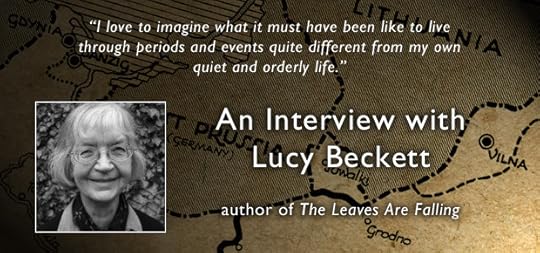An IPNovels.com interview with novelist Lucy Beckett

Lucy Beckett is an award-winning novelist living in Yorkshire, England, where she teaches at Ampleforth Abbey. Her novels include The Time Before You Die, A Postcard from the Volcano, and the recently released The Leaves Are Falling. She is also the author of In the Light of Christ: Writings in the Western Tradition.
Ignatius Press Novels interviewed Mrs. Beckett via email.
The Leaves Are Falling is your third work of historical fiction published by Ignatius Press. Why are you interested in the historical fiction genre?
Beckett: I am a historian by training, but I got married very young (age 19), had a lot of children and now grandchildren, live in the depths of the country, and have been a schoolteacher for 40 years (I still teach Latin in the local high school), so I never had a chance to do proper historical research, though I have written academic books on literature and music. So historical fiction is perfect for me: I can read plenty of books at home, and I love to imagine what it must have been like to live through periods and events quite different from my own quiet and orderly life. Because I am a teacher, I also like the idea of helping people to understand better things that they may know little about: the Reformation in England (The Time Before You Die), the descent of Germany into the horrors of Nazism (A Postcard from the Volcano) and now, in The Leaves Are Falling, what really happened on the Eastern front in World War II, where no British or American forces ever were.
This novel provides a lot of details about the historical events of World War II and the events after the war. How much research did you do before writing this novel? Do you have any favorite history books or resources that helped your research?
Beckett: I did a lot of work and read a great many history books. The two authors who were the most help with this new book were Professor Timothy Snyder, now at Yale, particularly his books The Reconstruction of Nations, and Bloodlands: Europe between Hitler and Stalin, and Yitzhak Arad: The Holocaust in the Soviet Union. I read dozens of other books, including all (not very much) that has been written about the Jewish partisans in Byelorussia, and about the Katyn massacre. (Everything that happens in the Soviet prison in the last third of my book is true, and Major Zarubin, the NKVD interrogator, and Rabbi Steinberg, are real historical figures.)
The novel tells the story of Joseph Halpern, an octogenarian book seller who finds a description of his father in a story, and wonders if his own story would be worth telling. Why did you decide to tell Joseph’s story in this novel?
Carl E. Olson's Blog
- Carl E. Olson's profile
- 20 followers



